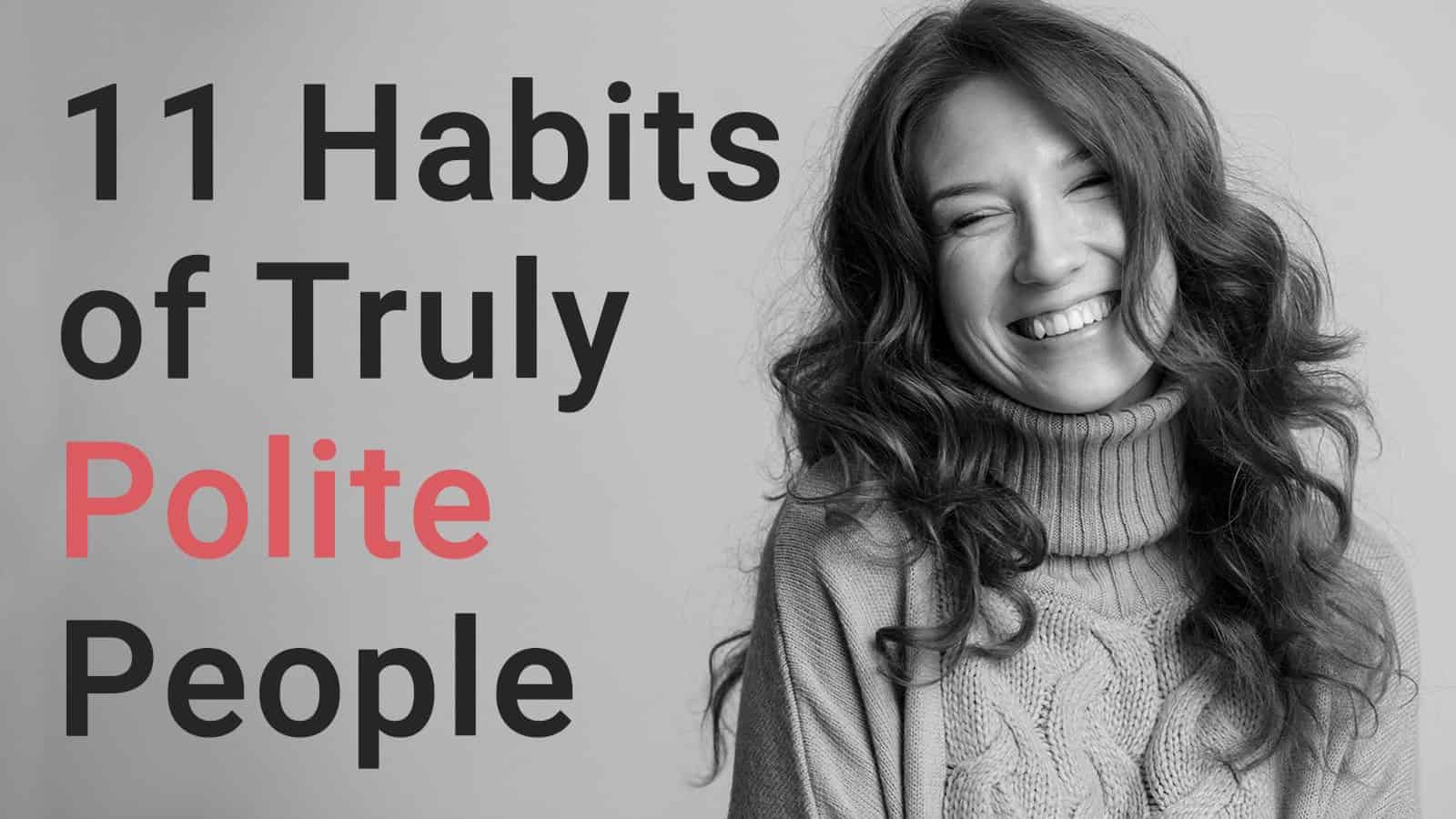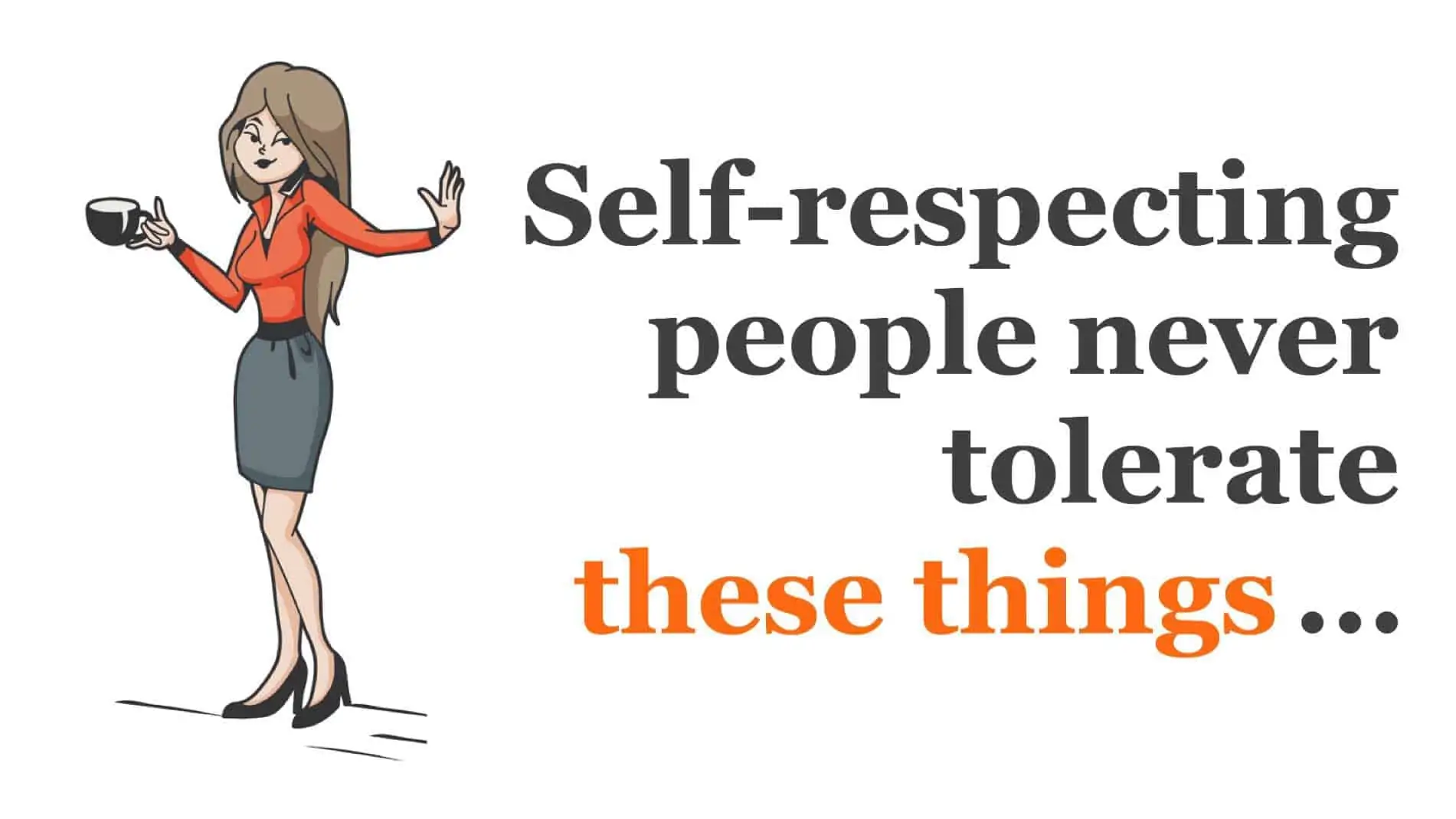The simple act of being polite can improve your life. Polite people often have better relationships, gain respect, and increase self-confidence and esteem. On the other hand, being rude can make life much more difficult.
It is fair to say that one’s propensity for polite behavior comes down to exposure. That is, if you grew up in a household where being polite was emphasized (or expected) you probably have proper behaviors and habits. On the other hand, if you were not taught the importance of being polite, you may lack some needed social cues.
In this article, we’ll talk about eleven habits of genuinely polite people, what studies say, and how you can be more courteous! Let’s get to it!
Here are eleven habits of polite people:
1. They’re excellent listeners
Polite people always seem to have excellent active listening skills. Active listening is the act of fully concentrating, understanding, responding to, and remembering what the other person says. Active listeners resist the urge to speak over someone. You allow people to finish their thoughts before introducing your own.
To improve your active listening skills:
- Give your full attention to the speaker. If your attention drifts, bring it back.
- Show that you’re listening by maintaining eye contact, nodding, and using positive body language.
- Give proper feedback by reflecting on and paraphrasing the speaker’s words
- Most importantly, do not interrupt unless necessary.
2. Polite people smile often
“Sometimes your joy is the source of your smile, but sometimes your smile can be the source of your joy.” – Thich Nhat Hanh
What do you think of when you see someone smiling? Well, like most people, you want to smile back. Have you ever considered why you often want to smile back when someone smiles? Well, besides being the polite thing to do, it turns out that smiling is (literally) contagious.
In one Swedish study, participants were shown a picture of a smiling face and asked to frown. Instead of frowning, the participants mimicked the facial expression in the picture – a smile!
3. They pay no mind to drama
Genuinely polite people don’t waste their time or energy listening to drama. They’re mature enough to know that not only is the drama pointless (no matter the form), but that it is also probably harmful to someone. While some less conscientious people see drama and think, “I can be a part of something,” the polite person sees drama and thinks “I want no part of it.”
Dismissing drama needn’t be abrasive or uncomfortable. When the local drama queen comes your way with a juicy tidbit, acknowledge with an “I see” and change the subject. No harm, no foul.
4. They’re not complainers
Okay, there is a time and place for (constructive) complaining. But there are complaining and complainers. The former is used as a conversational tool to air grievances; the latter is a type of person who takes the former to the extreme – by complaining about every little inconvenience.
Instead of complaining about something, write a gratitude list of three things for which you’re thankful. Put that list in your pocket. When the urge to complain about something arises – and it will – read your list.
5. Polite people think before speaking
We’re all adults now. As adults, we have the capacity – in fact, the obligation – to think before we speak. Not following such simple advice has led to many arguments, broken hearts, and damaged relationships. Polite people think before they speak at all times.
Here are a few things ways you can become a more thoughtful conversationalist:
- Don’t feel pressured to say anything, ever.
- If you require more time to respond, that’s okay; say so.
- When you are about to say something impulsively, acknowledge it, take a deep breath, and think before responding.
6. They remember names
If you’re bad at remembering someone’s name, you’ve probably had that embarrassing moment when you wanted to utter the person’s name but couldn’t remember it. So, you had to fill in the name with something else. (“Oh, hey … man/buddy/chum/m’lady … nice morning, eh?”)
If being seen as polite isn’t enough motivation to file away someone’s name, consider it an opportunity to avoid face-flushing embarrassment. Here are a couple ways to remember that “person next door”:
- Make a conscious decision to begin remembering names.
- Actively listen.
- Repeat their name, writing it down if you so wish.
- Associate the first letter of the person’s name with a physical or personality trait. (“Jen with the shiny Jewelry,” “Tom with the buck Teeth,” etc.)
7. They neither gossip nor listen to it
Guess we could’ve filed this one under number three, but here it is. Gossip is something that mature adults shouldn’t do, period. Anyone who despises gossip will tell you it’s pointless, energy-draining, annoying, and despicable.
Let’s put it simply. If you’re (a) initiating gossip or (b) partaking in any way, please stop. You’re not only hurting someone, but you’re also draining your own energy and positivity.
8. Polite people don’t proselytize
Having beliefs and opinions is okay. Trying to force your beliefs or opinions onto someone else is not okay. Needless to say, polite people don’t drone on about their precious beliefs and opinions, knowing that such behavior is immature and rude.
Polite people don’t proselytize about anything. Ever.
9. They respect personal boundaries
Few things are more sacred to most people than personal space. In fact, attempting to impede someone’s personal space is often punishable by a look of disgust and forceful “Excuse me?!” Violating a polite person’s personal space may result in a subtle step in the opposite direction.
Speaking of personal space, not everyone is okay with casual touching or patting, even when done with the best of intentions. Hey, don’t scold the messenger (a huge patter/hugger/backslapper, BTW!)
10. They treat others as equals
You’ve probably heard of Warren Buffett. For those who haven’t, Mr. Buffet is one of the world’s wealthiest men with a net worth of around $90 billion. Buffett, though a shrewd businessman, is also incredibly modest and unfailingly polite. Some people in the financial sector who follow Mr. Buffett have actually complained about Buffett’s flawless manners, writing an article titled “Mr. Buffett, you are too polite.”
Buffett has a reputation of treating everyone he meets with dignity and respect, regardless of so-called status. Polite people treat others with respect and as equals.
11. They don’t judge others
Truly polite people do not judge others. The reason is quite simple: they don’t know the other’s story, nor do we. Judging someone is the epitome of ignorance, not to mention rudeness.
The truth is that when we judge, there’s something about ourselves – not someone else – with which we’re miserable. It’s up to us to find out what that “something” is and cease with the malicious judging of others.
How to Be More Polite
Here are some things that you can do to be seen as a polite individual:
Say Hello!
Greet people properly, initiate and sustain eye contact while smiling, and be approachable. The simple act of giving someone a genuine “Hello” helps make an excellent first impression.
Make light conversation.
Light conversation is different than small talk. The former is constructive and polite, while the latter is annoying and pointless. Ask someone how their family is doing, how their new job is going, or if anything is new in their life. Be friendly and open while remembering to pay attention to verbal and non-verbal cues.
Make an effort to remember details.
Remember the person’s name and any pertinent information they share with you. Don’t be embarrassed to write the info down so as not to forget. Greeting someone by their first name is warm, thoughtful, and kind.
Polite people say “please” and “thank you.”
When asking for something, say “please.” When receiving something, say “thank you.” Simple, but you’d be surprised how many of us don’t say it.
Hold doors open for others.
There are few things more rude than some able-bodied person not holding the door open for someone who is right behind them. Don’t be this person. Hold the door for a couple of seconds. You can handle it.
Polite people use proper language.
Respect other people and use appropriate, well-mannered language. The words that come out of your mouth should fit with the situation. When in public, lay off the cursing (and yelling). Actually, it would probably be wise to avoid this type of speech in private, too.
Respect other people’s time.
This one’s simple: be there when you say you will be there. If you aren’t, you should have a good excuse. Also, use your good judgment in determining how much time to take up; consider that the other person may be busy.
Be assertive when needed.
Being polite doesn’t mean letting people take your kindness for weakness. Put your foot down when someone tries to get one over on you.
Apologize when you screw up.
“I’m sorry” are two words that would save our world a whole bunch of trouble if people said them more. While your pride may be telling you to do something else, ignore it and apologize when you make a mistake.
Use balance – don’t overdo it.
There’s being polite, and there’s being just plain weird. If you start talking like Ned Flanders from “The Simpson’s,” you act the latter. Be polite, yes, but be authentic and honest as well!
Final Thoughts on Polite People
Politeness, a seemingly simple concept, comes from several virtues: respect, kindness, restraint, and empathy, to name a few. As detailed, polite individuals are not just passive observers of etiquette. They actively embody practices that elevate their interactions, making the world around them a little brighter and more harmonious. From active listening to refraining from judgment, these behaviors reflect internal character and a testament to the conscious choices one makes daily. As society becomes increasingly polarized and, at times, tumultuous, the role of polite people stands out starkly as beacons of decency and civility.
Their actions of polite people remind us that treating others respectfully and kindly isn’t old-fashioned. Indeed, it’s timeless. Embracing and practicing politeness is an investment in personal growth and nurturing a more compassionate and understanding world.
















 Community
Community

